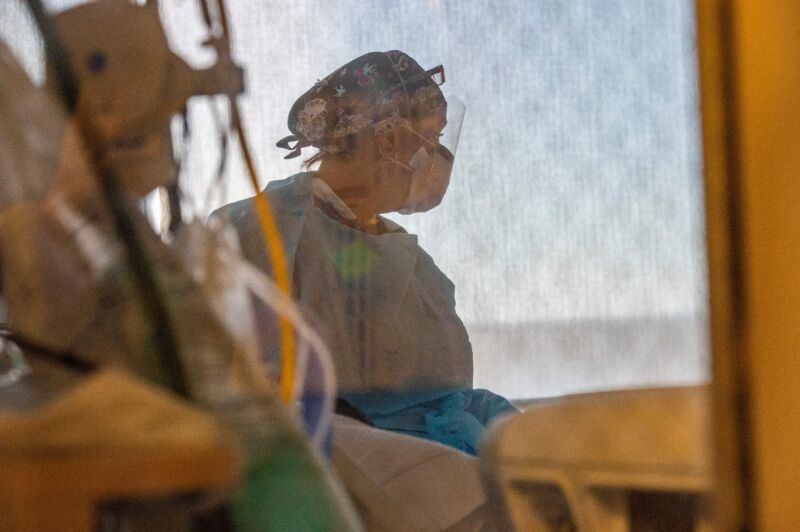WHO warns repeated COVID boosters not a viable strategy: Live
UN health agency calls for new vaccines that better protect against transmission amid emerging coronavirus variants.
![<div class=__reading__mode__extracted__imagecaption>A health worker prepares an injection with a dose of the AstraZeneca vaccine, in Ciudad Juarez [File: Jose Luis Gonzalez/Reuters]](https://www.aljazeera.com/wp-content/uploads/2022/01/2022-01-07T013347Z_1421761671_RC2NTR9LGNDM_RTRMADP_3_HEALTH-CORONAVIRUS-MEXICO-VACCINATION.jpg?resize=770%2C513)
". . .
Meanwhile, five million residents in China’s central city of Anyang on Tuesday started home confinement in a new lockdown to curb the spread of the highly transmissible strain, according to state media.
Elsewhere, British Prime Minister Boris Johnson is under renewed pressure amid a new surge in cases, after an email was leaked inviting about 100 staff to bring drinks to a party during the country’s first lockdown in May 2020.
=========================================================================
Crisis —
Doctors fear health care collapse amid omicron surge
Many hospitals across the country are in crisis as cases surge and staffing is at critical lows.

"Hospitals nationwide are once again buckling under the strain of COVID-19 cases as the ultratransmissible omicron wave crashes into health care systems that are already critically short-staffed and exhausted from previous waves of the pandemic.
The current situation is forcing states and hospitals to declare emergencies, deploy the National Guard, delay or cancel elective procedures, institute crisis standards of care, and allow health providers to stay at work even if they themselves are positive for COVID-19 because there is no one available to take their place. Together, the situation has some doctors openly worrying that the omicron wave will cause some systems to collapse in the coming weeks.
"The comforting news that this variant generally causes milder disease overlooks the unfolding tragedy happening on the front lines," Craig Spencer, an emergency medicine physician and director of global health in emergency medicine at NewYork-Presbyterian/Columbia University Irving Medical Center, wrote in a New York Times opinion piece Monday.
Spencer noted that, unlike this time last year, there are effective COVID-19 treatment plans, therapeutics, and vaccines. "Yet these tools are still not enough to slow the rapid influx of patients we’re now seeing from omicron, and the situation is bleak for health workers and hospitals."
>
Numbers and projections
Currently, the seven-day average of daily COVID-19 cases is nearing 700,000—an all-time high in the pandemic. Meanwhile, daily hospitalizations are averaging over 132,000, up 83 percent in the course of two weeks. The number of hospitalizations is quickly nearing the all-time record of around 137,000 hospitalizations per day in the pandemic, which was set in mid-January last year.
According to data reported by the Department of Health and Human Services, 77 percent of hospital beds in the country are occupied and 78 percent of beds in intensive care units are full. But the department's data can have lags, reflecting hospital usages that may be one to two weeks behind. For instance, physicians and researchers tracking hospital capacity suggest Maryland's hospitals may now be hitting capacity, based on a projection of lagging HHS hospital data that suggests hospital beds are only 79 percent full. . .
>
Strained systems
Though a smaller proportion of people infected with omicron appears to develop severe COVID-19, there's still a crush of patients, and some of them are suffering the worst of the disease. Last Friday, for instance, a hospital in Kansas ran out of ventilators amid a surge in COVID-19 cases, spurring the county board to issue a local emergency bulletin. In addition, omicron is reaching vulnerable populations that end up needing hospital care after omicron exacerbates a previous condition, such as diabetes. Meanwhile, seasonal flu and other conditions bringing people to hospitals are also at high levels.
The surge of patients is coming at a time when overstretched hospitals are already critically understaffed and providers are facing extreme burnout.
On Monday, Virginia Gov. Ralph Northam issued a limited 30-day state of emergency to try to ease the strain on overburdened hospitals after the state saw record numbers of hospitalizations last week. The order allows hospitals to increase their bed capacity and increase staffing through a number of technical changes, such as adding flexibility for active out-of-state providers to practice in the state and expanding the ability of physician assistants to provide care. . .
>
Easing the strain
Neighboring Maryland issued a similar 30-day state of emergency last week to buttress the state's health care facilities amid record-high COVID-19 hospitalizations.
"The truth is that the next four to six weeks will be the most challenging of the entire pandemic," Maryland Gov. Larry Hogan said in a statement last week. "All of the emergency actions we are taking today are to keep our hospitals from overflowing, to keep our kids in school, and to keep Maryland open for business, and we will continue to take whatever actions are necessary in the very difficult days and weeks ahead." . .
READ MORE >> https://arstechnica.com/science/2022/01/hospitals-nationwide-are-buckling-under-omicron-as-cases-continue-to-spike/


No comments:
Post a Comment